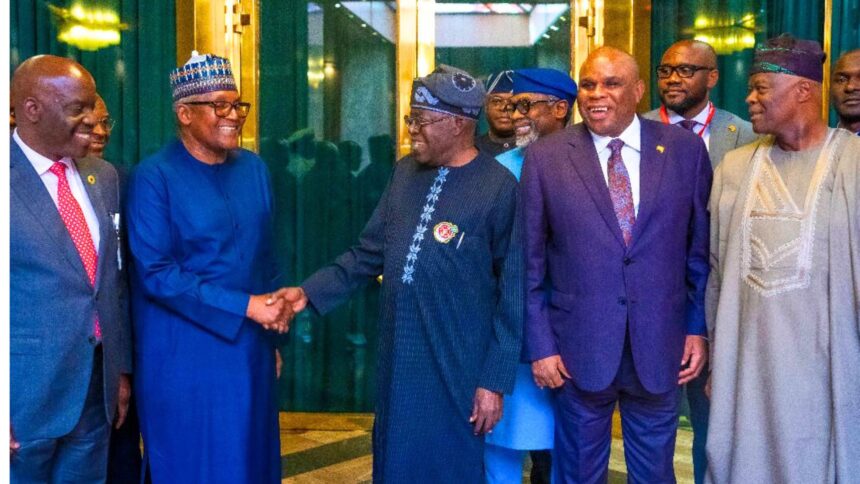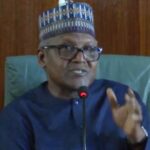.., charges NNPC,Dangote, stakeholders to use Afreximbank as settlement bank to resolve the Naira pricing for crude and refined products
Oredola Adeola
President Bola Ahmed Tinubu has reaffirmed his administration’s commitment to implementing Naira-based sales of crude oil and refined products, insisting there will be no return to past practices.
He encouraged midstream and downstream stakeholders to leverage Afreximbank as a settlement bank to facilitate the Naira pricing model, noting that the institution is already serving as the financial adviser for the initiative.
Speaking on Tuesday in Abuja, President Tinubu commended the Implementation Committee for their efforts and urged them to resolve any initial challenges.
Bayo Onanuga, Special Adviser to the President on Information and Strategy, disclosed this during a press briefing following a meeting with the implementation committee at the State House.
Onanuga emphasized that the initiative aims to streamline crude sales to local refiners, who will in turn sell refined products in Naira.
President Tinubu explained that adopting the Naira for oil transactions is intended to eliminate exchange rate complications.
“Any solution we offer in this sector must ensure we do not revert to the experiences of the last 40 years,” he stressed.
He further stated that while adjustments in costs and revenue may occur, the government is determined not to return to outdated methods.
President Tinubu further explained that the various players in the oil sector, including the Nigerian National Petroleum Corporation Ltd and the Dangote Refinery, should work to improve the economy and the livelihood of Nigerians.
The President urged stakeholders to look inward and consider supplying enough petrol and petroleum products for local consumption to stop the persistent reliance on importation.
He said this would enable the channeling of foreign exchange into the development of the real sector.
“The market must determine what we are doing. Once you allow the market to determine the profit and loss, independent marketers and the government side can meet on the worksheet.
“I want the issues resolved without future waste of time,’’ he added.
“We can have energy security, and the motivation for Alhaji Aliko Dangote will not be defeated. It will be more predictable on a medium and long-term basis,’’ the President said.
Wale Edun, Minister of Finance and Coordinating Minister of the Economy, said the administration’s groundbreaking steps to sell crude in Naira would not be reversed, and the government would not be involved in determining the rate of exchange for the oil sector.
According to him, with Dangote’s 650,000 bpd refinery setting the pace, this approach ensures market-driven pricing for both petroleum and foreign exchange, fueling private investment, economic growth and job creation. Nigeria is now taking important steps along the path to industrialisation and modernisation.
“To date, the Implementation Committee and Subcommittee have worked tirelessly with all stakeholders—regulators such as the NMDPRA, NURPC, NIMASA, NNPCL, NPA, the Navy, and others—to ensure the smooth execution of the initiative, which is already in progress.
This initiative has made it possible for Nigeria to adopt market-based pricing of petroleum products, alongside market-determined foreign exchange rates, setting the economy on the path to industrialization.
With the private sector now actively refining crude oil, Nigeria not only has access to raw materials for fuel production but also to petrochemicals essential for industries such as paints, building materials, textiles, and plastics.
This is in line with Mr. President’s strategy to create the right conditions for the private sector to invest, create jobs, and grow the economy.
Market-based petroleum pricing has also paved the way for NNPC to restore its financial health and strengthen its balance sheet.
This improvement will, in turn, boost revenue for the Federation—including federal, state, and local governments—enabling them to meet their obligations for social services and key infrastructure development.
Though these are still early steps, the Nigerian economy has been set on a clear path toward industrial development and modernization.
With key prices now aligned with market realities, we expect to attract more private investment and foster sustainable economic growth.
To ensure the successful implementation of Naira-based sales of crude oil to domestic refineries and the local sale of refined products in Naira, any initial challenges will be addressed promptly.
He assured that President Tinubu remains fully committed to making the strategy work.
The Minister further said, noted that the Afreximbank plays a crucial role as a financial adviser and intermediary.
He said, “The multilateral financial institution will provide support by facilitating transactions between crude buyers and sellers, ensuring smooth operations even amid currency volatility.
Edun emphasised that with Afreximbank’s involvement, we aim to ramp up production of refined products and enhance their distribution within the Nigerian economy, setting the stage for sustained economic growth.”
Zach Adedeji, Federal Inland Revenue Service Chairman, who chairs the technical committee, said importing refined products should end once we have the capacity to produce enough to meet domestic needs.
“The vision of Mr. President is to turn Nigeria into a hub for refined products to export to the world.”




